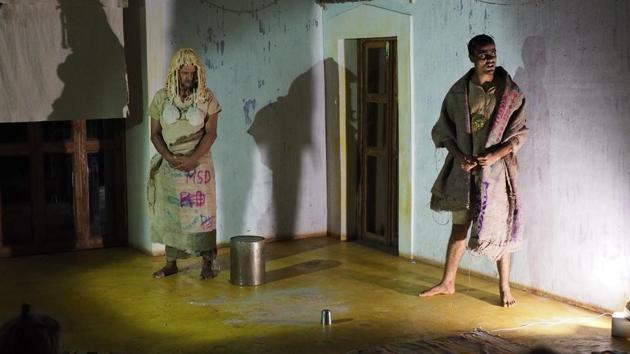‘Theatre in Pune has seen better days’
Theatre artiste and writer Hartman De Souza talks about his forthcoming plays, the theatre scene in the city and more
Studying philosophy as a young student at the then Pune University (Savitribai Phule Pune University), Hartman De Souza, 69, recalls how they had managed to come up with four English plays. The 1973 batch before them had three plays in their kitty. “This is how theatre thrives,” says De Souza, who will be staging his English play “The Island” in the city at Sudarshan Rangmanch, Shaniwar peth on October 17.

The sixty-nine-year-old theatre artiste and writer is disheartened at the current scenario of Marathi and English plays in the city. He grew up watching Marathi plays, including the works by legends Vijay Tendulkar, Dr Shriram Lagoo and Nilu Phule. “They were and are amazing people, whose quality work reflected through their plays. Now, if you ask me, I only see Satish Alekar as the last playwright of those times.”

Underlining the vibrant days that English and Marathi theatre has seen in Pune, he admits of not having an immediate solution for it and calls for scope for change. “Students need to be taught to respect the art and the workings of theatre. These intercollegiate theatre competitions need to stop. They create an unhealthy competition that dies down once the event is over. What after that? Students should focus on theatre throughout the year, not just to shine in an event.”
He goes on to say that people like Tendulkar are like a colossus, and he hopes they make a comeback soon. “I have been practising theatre for 13 years. I have grown up watching Marathi theatre. It may not be my mother tongue, but I understand it. The plays today are not as powerful as they used to be earlier. I hope people take cognisance and work towards bringing back quality plays.”
De Souza suggests that schools could play an important role in strengthening the theatre scene in the city. “If we encourage students to respect theatre as a subject then things will be easier. It cannot be considered as a miscellaneous subject.”
He is currently rehearsing with young actors for his play The Island. It is a topical play written in 1972 by South African playwright Athol Fugard. It talks about the anti-apartheid movement in South Africa and the problems that followed.
“I first staged Fugard’s The Island in New Delhi in 1986, with a grant from the Africa Fund set up by the ministry of external affairs, and supported by the Indian Council for Cultural Relations. Bear in mind that in 1986, Nelson Mandela was still imprisoned on the infamous Robben Island, the setting of the evening’s performance. In 1986, the play was alive, and fresh.”
In 1991, beginning work on a three-year theatre project in Goa funded by The Ford Foundation, New Delhi, he staged the play at the Kala Academy with two Kenyan students studying at Goa University; and six months later, with an adaptation of the play into Malvani, titled Dipall. He also staged The Island with four different sets of actors in Bengaluru (twice), Chennai and Pune. From 2000 till 2007, he taught theatre as a subject in both the International Baccalaureate and International General Certificate of Secondary Education (IGCSE) levels, and always began his classes with Athol Fugard’s The Island.
He says, “As a work of theatre, the play is ideal for performance. In seven years of teaching theatre, I have not met a student who wasn’t inspired by it, with its form and its content. His device of using a play within a play to tell a story, I can’t think of a play that does it better. More importantly, it makes itself a ‘universal’ story.”
What: The Island
Where: Sudarshan Rangmanch, Shaniwar peth
When: October 17, 7.30pm
Voices from Pune’s theatre artistes
The pattern has changed, but the core audience remains the same. In terms of space, we have seen a number of places mushrooming which is boosting the confidence of aspiring artistes. The positive signs are that content is being experimented with and we have seen a revival in terms of subjects. However, the intensity of audience has reduced.
Satish Alekar, playwright
At present we are going through a different and difficult phase. There are several promising youngsters doing theatre. But the theatre spaces and audiences are not responding to them in the expected manner. Nowadays, theatre sees a lot of reading performances. There is a dearth of actors who can devote their full time to theatre. Similarly, we need writers and directors who can devote their energy towards theatre and express without fear in their own languages. We are in search of new theatre languages. We are trying to explore new theatre spaces but this is not sufficient without people’s support. The situation in Pune is still better than other cities.
Atul Pethe, director and writer
New people are exploring new paths and new subjects. I wouldn’t say it is degrading as such. Although, with the growing technology and avenues, the young minds are finding various ways of expressing. Web shows , short films, blogging, social media are new mediums of expression. Youth is turning towards it since it has entered our lives like a hurricane. Theatre might be getting affected. Won’t call it degradation. Maybe it’s a transition phase. Theatre is a very strong medium and I am positive everyone will eventually come back to it.
Vibhawari Deshpande, actor, writer



